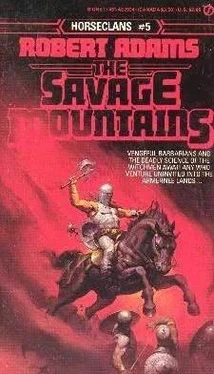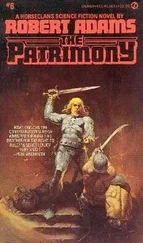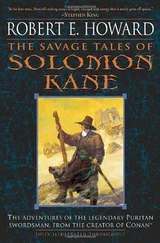Since Vaskos had refused to alter or lessen his long, work-filled hours, Ahlee had done what he felt to be both professional duty and the duty of a friend; he had been helping the harried commander with the paperwork, of nights. Nor was this a difficult undertaking for the Zahrtohguhn, for, combined with a high degree of intelligence and both a written and verbal command of most dialects of Mehrikan, Ahlee had a natural talent for and formal training in mindspeak so that he could resolve any questions by dipping into Vaskos’ deliberately unshielded mind.
So it was, on an evening six days after his last autopsy, that a breathless, red-faced sergeant found them both together in Vaskos’ bright-lit office a couple of hours after midnight.
The sergeant was not an ex-rebel but rather a grizzled Confederation Regular, and he behaved accordingly despite his agitation—this quite obvious to Ahlee’s trained eye. Upon being bidden to enter, he stalked stiffly across the room, his well-oiled armor clanking, his helm cradled in the crook of his shield arm. At the halt, he wheeled precisely to face the desk and, standing rigid as a post, slammed fist against breast in formal military salute.
Glancing up from under his bushy salt-and-pepper brows, Vaskos returned the salute. “Yes, sergeant? You have a report?”
In a firm, emotionless voice, the noncom replied, “My lord strahteegos, I be Company Sergeant Dahbzuhn of Number Three Company, Fourteenth Regiment, seconded to your lordship’s command and now serving under Lieutenant Gahloopohlos. The noble lieutenant bids me request your lordship’s presence in the north quarter of the city. And it please your lordship, immediately.”
The lieutenant was tall but slender, his dark hair and olive complexion attesting to his Ehleen antecedents. His were no rolling, bulging muscles, but he moved with an assurance and grace which Ahlee suspected emanated from considerable wiry strength. The young man was soft-voiced and respectful to his superior but with no trace of fawning.
“My lord strahteegos, knowing how intense be your interest in these murders, I took the liberty of sending for you. This may well be a discovery of importance.”
The one-eyed man, summoned from a small knot of fellow civilians, completed his tale a few minutes later. “So, like I a’ready done told the lieutenant, Lord Vaskos, after I seen the man knock Moynah in the head and put her over his shoulder, I follered him, ‘th out him seeing me, o’course; I ain’t brave, ‘specially as I seen he had a big dirk.
“I seen him carry her into this here empty house, then I run back and got these here other fellers together and while one feller went to look for the p’trol, we got us some torches and clubs and a few knives and went to save her. But, when we got to the house, won’t nary a sign of either one of ‘em, ‘cept just a little bit of blood just inside the door and a little more on the steps going down to the basement, was all. Then, ‘bout that time, the lieutenant and the p’trol got here.”
With a brusque nod of thanks to the old man, Vaskos turned on the junior officer. “It comes to my mind that the killer, if such it was, knew that he was being followed and ducked into the house until he was certain that the observer had gone. Could that be possible, lieutenant?”
With a typically Ehleenic shrug, Gahloopohlos answered, “Highly possible, lord strahteegos. And I considered it, too, especially when my men found no living creature in the house … and we searched it from top to bottom. But that was before we chanced across what I wish to now show your lordship.”
The cellar was old, obviously much older than the house above, larger, too, walled and floored with dressed stone, like the worn stairs which led down to it Droplets of blood were at the head of those stairs, a few more were at the bottom, and yet another sprinkling was at a spot near the east wall of the cellar, along with a faded scrap of fine woolen cloth.
“When first I came down here, my lord, this bit of cloth was protruding from between two of the wall stones. I thought it odd and examined the wall more closely. As my lord may know, my father is lord architect of Kehnooryos Atheenahs. My brothers and I often accompanied him in his duties in that and other cities, so I have some small knowledge of things which might not occur to the thinking of your average officer.
“Look around you, my lord. This cellar is clearly of older and finer construction than the structure upstairs, and it’s at least half again bigger. The original structure was no doubt stone as well, stone and timber, and it burned. If my lord will look up there, near the ceiling, he still can see the fire marks. That structure was never rebuilt, but its foundation, including this cellar, was used for the brickwork house still standing.”
“What,” demanded Vakos, “has all this to do with our elusive murderer, lieutenant?”
With a languid, assured smile, the officer replied, “Please bear with me, my lord. Now, when these frontier cities were built, often the citadels and walled mansions were completed before the city walls even were commenced. So, since the residents and garrisons were often in constant danger of barbarian attack, they frequently devised ways of communicating one with the other, of getting supplies or reinforcements to hard-pressed areas quickly and safely, of—”
Vaskos’ big fist smacked into his horny palm and his black eyes flashed. “Tunnels! Of course! That’s why we’ve never caught the bastard, or even seen him, despite streets crowded with patrols. I must be getting senile, lieutenant I should have thought of it ere this.”
Young Gahloopohlos showed a rueful grin. “Then I fear I must share my lord’s senility, for even with my experience, I gave no thought to the matter until it slapped me in the face.”
Vaskos nodded brusquely. “Well, we know now, good Gahloopohlos. It sounds reasonable to me. Let us get a squad down here with sledges and bars, get these stones down and see if we’re right.”
The officer shook his head. “Such measures are unnecessary, my lord. You see?” Sidling to a section of wall which looked no different from many other sections about the cellar, he placed both hands flat upon it and, bunching his body behind his shoulders, heaved. His feet slid back on the rough flooring as the wall section briefly resisted his strength, but then, with a ponderous grinding and a shriek of seldom-used metal, a man-length of wall swiveled to reveal a stygian-black rectangle from which emanated the cold, dank smell of sunless earth.
Vaskos waited for the arrival of additional men before he, Ahlee, the lieutenant and a squad of soldiers filed into the narrow tunnel. Only a few steps did they proceed, however, for the way was blocked by a mound of earth and chunks of soft, rotten timber. An aperture no more than two feet wide or high had been dug through the blockage, and there they found more blood and another shred of the same fine, woolen.
There was another wait, for not liking the look of the extant shoring, Vaskos had some of the soldiers repair the areas above and return with odds and ends to strengthen the worm-eaten boards and columns. Then, one at a time, holding their torches before them, the officers, the physician and a dozen men wriggled through the ten terrible suffocating feet of crumbling earth.
Beyond, the narrow tunnel continued for a few more paces, then entered at a right angle into a wider and better-shored tunnel which seemed to stretch infinitely away in two directions.
“Sun and Wind!” swore Vaskos, softly. “The bastard could have taken that poor woman in either direction.
There’s nothing else for it but to split up. Gahloopohlos, you take six men and head that way. The master and I will take five and head the other. Sergeant Dahbzuhn, go back to the cellar and get the other squad, less two men to stand guard. You bring five after me and send five after the lieutenant. And sergeant, all of you, make no unnecessary noise until the quarry’s in plain sight and, let’s hope, at bay. He surely knows these tunnels better than we do, and we can’t afford to miss him yet again.”
Читать дальше












